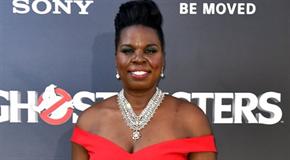Features
Jones Website Hack Reveals Stars’ Tricky Cyber Landscape
While Jones’ supporters have been vocal with their outrage and Department of Homeland Security investigators are looking into the breach of Jones’ website that exposed intimate photos and personal documents, experts say little can be done to prevent online hacks and harassment. Internet trolling is impossible to predict and difficult to prosecute.

Jones’ site remained offline Thursday and the actress-comedian has stayed away from social media since the Wednesday attack. Her representatives did not respond to inquiries from The Associated Press.
Those who broke into Jones’ site and replaced its usual content with naked photos, a driver’s license and racist video are clearly breaking the law, said attorney Jonathan Steinsapir, but “trolling” a celebrity with sexist or racist posts online is not a crime.
Jones was targeted on Twitter last month, receiving a barrage of racial slurs and obscene photos. The “Ghostbusters” actress called on the site to do more to curb harassment, and Twitter banned several users as a result.
“She’s done all the right things,” said Brendesha Tynes, a University of Southern California professor who specializes in cyberbullying and social media. “You report, you block â?? she’s done all those things. One thing she definitely needs to do is to really rally her tribe.”
Apart from technological solutions like hard-to-crack passwords, public social-media support is one of the best defenses against online trolls, said Dorie Clark, a branding and social media expert.
“Ultimately, the best thing you can do as an insurance policy is to create a community of loyal fans and friends that will stand up and defend you and essentially try to fight back against the trolls and the negative posts,” she said.
Such support also offers psychological support to trolling victims, who might experience depressive symptoms after an attack, Tynes added.
Scarlett Johansson said she was “truly humiliated and embarrassed” when stolen nude photos of her were published online. The hacker in that case was sentenced to 10 years in federal prison.
Most often, though, technology moves faster than the law.
“The availability of media now and how quickly information spreads â?? I don’t think the law has kept up with that,” said Steinsapir, who specializes in intellectual property and copyright law.
For example, once stolen photos are disseminated online, it’s not only tough to track who’s republishing them, it’s practically impossible to prosecute.
“The problem is that the material from the hack eventually finds its way into other people’s hands and gets posted on Reddit or whatever,” Steinsapir said, “and it’s very hard to go after those people.”
Going offline entirely isn’t an option for most celebrities. Entertainers are generally expected to help market their shows on their social media platforms, Clark said. And Jones, who took a break from Twitter after last month’s attack, returned to the platform to live-tweet the Olympics, which won her a trip to Rio and a commentator gig on NBC.
“For a star to totally opt out of social media is essentially tying one hand behind their back and limiting their appeal and utility to the studios who can hire them,” Clark said.
The savviest celebrities build a community of fans online who will both turn up at the box office and speak up online, she said.
“If you are not just using social media in a rote, self-promotional way where it reads like every tweet has been written by your publicist, but instead you’re using it to creatively and authentically engage with fans, that builds a level of trust and loyalty that encourages people to support you and stand up for you,” Clark said.
And all the experts agree: Taking naked photos and storing them digitally is probably a bad idea.